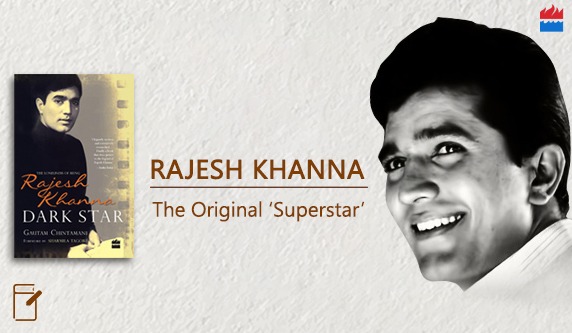Rajesh Khanna, a born king who found his kingdom in the hearts of the people of India.
There were two Rajesh Khannas. One who ruled the world of Hindi Cinema, and the other who couldn’t open up his heart to even his closest ones. People found his charm intriguing and his smile magical. The twinkle in his eyes even puzzled the most seasoned of journalists.
His way of speaking melted even the hardest of stone hearts. The stories of women getting married to his photographs were laughed at, but there are credible sources that testify to such events taking place.
Sure, there are many ways of looking at Rajesh Khanna. The one who brought the enchanting melodies to Hindi Cinema, or the one who could romance with his eyes only, or the one who could never understand the nature of time and life in general.
He was born a king and died like one. He left a legacy so tall that now it is covered in clouds and remains invisible to the younger generation. Discovering him all over again would be an Aavishkar in itself.
The Loneliness of Being Rajesh Khanna
After his lonely and painful death in 2012, people suddenly stopped in their tracks and took a relook at Rajesh Khanna’s legacy. Some even thought, ‘was Kaka even alive?’ To die in the audience’s memory was the last thing Rajesh Khanna wanted. He thrived on the love and attention that he got from his fans.
But as the law of nature goes, you get what you deserve and not necessarily what you want. Now, not getting what one wants is perfectly normal for us mortals. But for Rajesh Khanna, he reached there. He saw it all. He scaled such breathtaking heights that he could see the end of the world somewhere across the horizon. He got love in such massive troves that he rose to the level of superhumans, or at least he thought so.
Times change as they do. People come and people go. Rajesh Khanna’s time also went away, however hard he tried to deny the facts of life, his fading star which ultimately died, first metaphorically in the early 90s and then in reality in 2012, left such devastating darkness behind that people have a hard time passing on their love for Rajesh Khanna to the younger generation.
Rajesh Khanna, Dark Star
Gautam Chintamani brought out a comprehensive biography of Rajesh Khanna in 2014. Titled, Dark Star: The Loneliness of Being Rajesh Khanna the book steers clear of anything sensational which must have been a task unto itself as Khanna was a sensation himself and was always surrounded by controversy.
True to his cinephile identity the writer provides synopses of all the RK films. As he says in the Author’s Note to the book, “I have taken the pain to provide a synopsis of the films he[Rajesh Khanna] has acted in, even though these are not the films that people remember Rajesh Khanna for.”
The foreword to the book has been written by Sharmila Tagore who worked with Rajesh Khanna on so many films that sometimes even the most sincere cinephiles get confused as to which song was from which film.
Through Aradhana Rajesh Khanna rose to instant national fame. Film magazines referred to him as the “First Superstar of India”. Rajesh Khanna was cast in a double role (father and son) opposite Sharmila Tagore and Farida Jalal. It also saw the resurgence of Kishore Kumar, who after accepting the pre-mature death of his acting career eventually became the official playback voice of Rajesh Khanna. They worked together until Kishore’s death in 1987 and songs of their combination were released until 1991.
The book does a great job of bringing out the stories of collaborations. Instead of stooping to gossip and hearsay, the book focuses on the authentic sources that are people who worked for and around Rajesh Khanna. One thing that also makes the book a worthy biography is that it doesn’t pay much heed to the gossip magazines and their editors who put Rajesh Khanna behind the cloud of a mystery.
Aakhri Khat, the Beginning is the End
For the fans of Rajesh Khanna, the book will be invaluable as it puts all RK films on record with proper commentary on each one of them. It’s not a self-indulgent attempt at biographing a life that is enough for being at the center of the attention. But I’m afraid for a lay reader, that too a young one, the book may seem like a tedious log engulfed in data like a “boring” history textbook.
But I guess, with this book, Rajesh Khanna has another sincere piece of work attached to his legacy. We’ll have to thank Gautam Chintamani for that.
In the end, I leave you to the kind of natural force Rajesh Khanna personified with this quote pointed by Sharmila Tagore in the foreword to the book, “It is apt when Shantanu Ray Chaudhuri says in his book Icons From Bollywood (Penguin Book India): unlike bigger icons and stars, ‘Rajesh Khanna’s claim to greatness basically lies in his achievements over a period of barely three years, There have been actors in the limelight for longer durations, more talented artistes who have shaped opinion and have continued to be talked about across generations. None of these hold true for Rajesh Khanna … But on the strength of those three years, 1969 to 1972, he will always find a place in any discussion on Hindi cinema. For, in those years, he was Hindi mainstream cinema.’
The book can be picked up for the sheer pleasure of rediscovering the songs that still echo in our hearts. Those Kishore Kumar melodies, those soulful Mukesh and Manna Dey songs still take us to Rajesh Khanna, the Dark Star whose legacy shines through.





No Comments